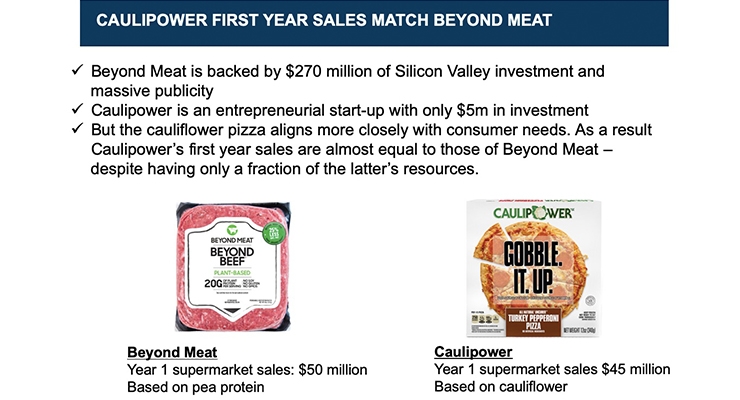Market Updates
Who’s Winning the Protein Wars? Cauliflower Outperforms Meatless Burgers
Consumers want simple, natural, and least-processed foods.

By: Sean Moloughney

Entrepreneurial start-up Caulipower’s vegetable-based pizza achieved $45 million in U.S. sales in 2018, its first full year on the market, and is anticipating $100 million this year. That’s a far more impressive performance than that of meatless burger maker Beyond Meat, which managed U.S. grocery sales of $50 million in the same year, despite massive publicity, hype, and over $200 million of investment, noted Julian Mellentin, director of food business consultancy New Nutrition Business.
“The success of Caulipower—and other plant-based brands just like it—underscores that consumers don’t want extruded plant protein burgers as much as they want convenient, all-natural vegetables,” said Mellentin, author of a new report, “How to succeed with the plant-based food trend: Four strategies for success—and one to avoid.”
Caulipower—and other brands like it, from PepsiCo’s Off the Eaten Path to Love Beets—align closely with what the health-conscious consumer wants, said Mellentin. Plant-based products with short ingredient lists that are “natural” and “least-processed” link strongly to the eight consumer motivations that are driving the plant-based food trend, he added.
For many consumers, for example, having even just 20% or 30% of veggies in a burger, cookie or pizza crust gives the product a health halo that makes it seem like a better choice—and, in the case of Caulipower, offers a gluten-free alternative to a conventional pizza.
“The plant-based food trend presents companies and brands with a major growth opportunity, but they need to choose strategy carefully,” cautioned Mellentin. “There are five strategies that food companies can choose from. One of these—plant-based meat substitutes—is already a hyper-competitive market. But there are four other strategies that offer much better opportunities for building a profitable and sustainable business.”
“Burgers made from plant proteins are held up as the next growth market—and Silicon Valley investors are getting excited about their money-making potential,” he said. “But many of these investors will be disappointed, because the meat substitute business is already underperforming and seriously overcrowded compared to other plant-based offerings, and fails to meet consumers’ needs for simple, natural, and least-processed foods.”


